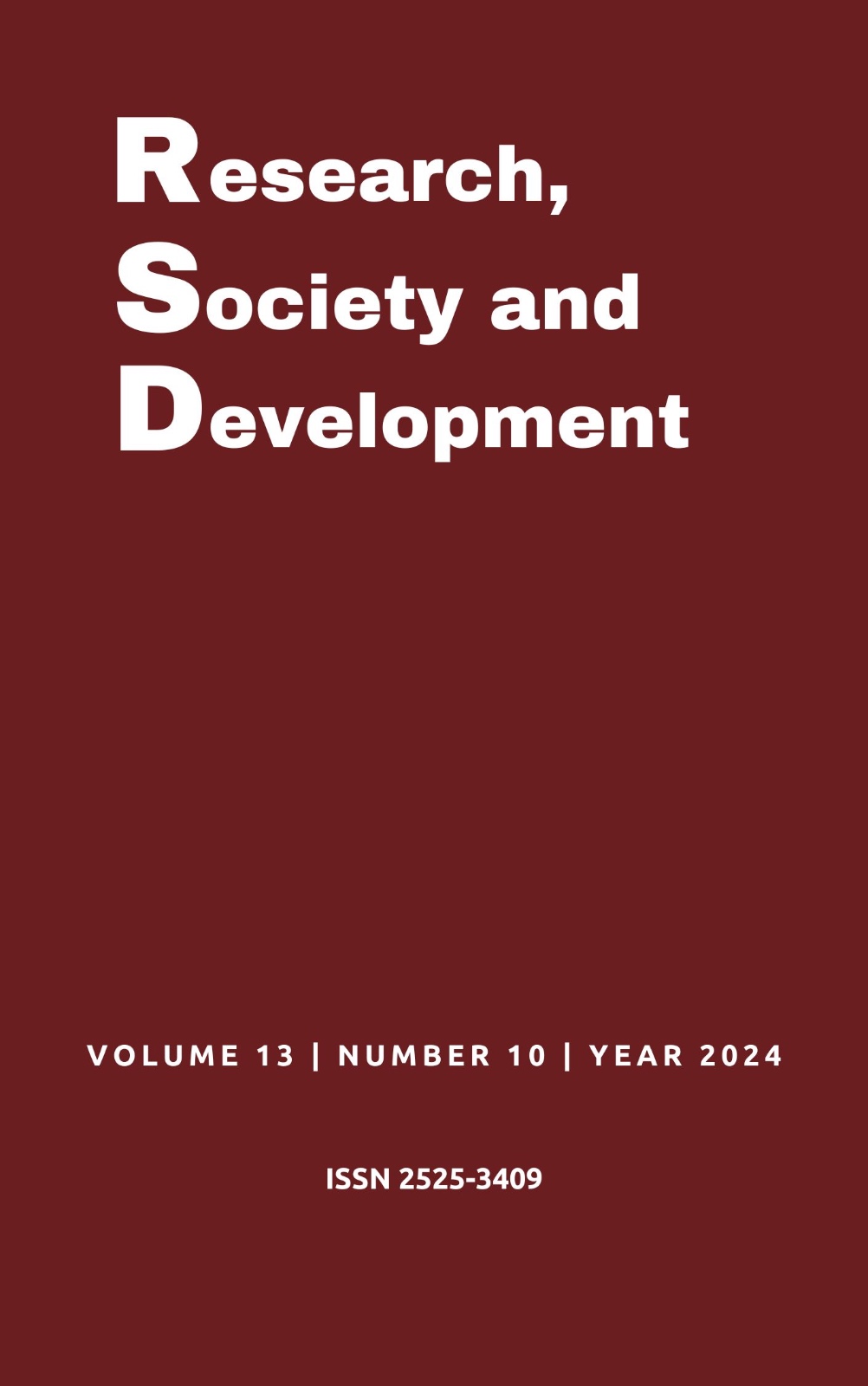A physical-chemical and theoretical-practical analysis of icebergs
DOI:
https://doi.org/10.33448/rsd-v13i10.46993Keywords:
Ice, Water, Fusion, Teaching and learning, Teaching Physics, Reflective teaching.Abstract
This research aims to present a theoretical-practical discussion about icebergs through a simple experimental design, with low-cost materials, exemplified by the system consisting of an ice cube inserted into a glass of drinking water. We sought to verify the effects of water temperature and solution concentration on the melting process, to then correlate with external conditions that could or could not favor the melting of icebergs. To achieve the proposed objective, ice cubes were removed from the freezer and then inserted into containers that contained liquid water at different temperatures. The second experimental design involved inserting the cube into solutions with different concentrations of sodium chloride, the results of which were compared to those of drinking water. Comparative analysis indicated that reducing the temperature of the water to which the ice was added increased the time required to complete melting. On the other hand, when the temperature was maintained, it was evident that the addition of sodium chloride increased the necessary time interval. The importance of developing this work is highlighted, since the analysis of the results will be able to answer questions about everyday facts related to floating blocks of ice.
References
Amaral, P. F. de et al. (2022). A ciência em uma abordagem interdisciplinar. CEFET-MG.
Atkins, P. & Jones, L. (2011). Princípios de Química: Questionando a Vida Moderna e o Meio Ambiente. (5a ed.), Bookman.
BBC. Com (2007). Icebergs podem ajudar a conter o efeito estuda, dizem cientistas. https://www.bbc.com/portuguese/reporterbbc/story/2007/06/070622_icebergoceano.
BBC News (2022). Derretimento do maior iceberg do mundo liberou quase 50 vezes consumo de água do Brasil por dia. https://g1.globo.com/google/amp/meio-ambiente/noticia/2022/01/20/derretimento-do-maior-iceberg-do-mundo-liberou-quase-50-vezes-consumo-de-agua-do-brasil-por-dia.
Brasil Escola (2024). Iceberg. https://brasilescola.uol.com.br/geografia/iceberg.htm#:~:text=Com%20o%20aquecimento%20global%2C%20a,o%20nome%20de%20A%2D76.
Brown, T. L., Lemay, H. E. & Bursten, B. E. (2005). Química: A ciência central. (9a ed.), Pearson Education.
Capital Financeiro (2024). É assim que o mundo ficará se todo gelo derreter. https://www.youtube.com/watch?v=jECb3N3clvA.
CNN BRASIL (2021). Bióloga: ‘desprendimento de iceberg não vai provocar aumento do nível do mar’. https://www.cnnbrasil.com.br/internacional/biologa desprendimenbiologto-de-iceberg-nao-vai-provocar-aumento-do-nivel-do-mar.
Freud, S. (1933). New Introductory Lectures on Psychoanalysis.
Furtado, C. (2017). Descubra o Iceberg de Freud- Primeira Tópica. https://melkberg.com/2017/02/19/iceberg-de-freud-primeira-topica/.
G1 (2024). 'Geleira do Juízo Final' corre mais risco de derretimento do que a ciência sabia, diz novo estudo. https://g1.globo.com/ciencia/noticia/2024/05/21/geleira-do-juizo-final-corre-mais-risco-de-derretimento-do-que-a-ciencia-sabia-diz-novo-estudo.ghtml.
Gomes, A. V.; Amaral, E. M. DE S.; Prado, R. J. (2019). Determinação da densidade de líquidos imiscíveis pelo princípio de Stevin. Revista Brasileira de Ensino de Física, 41 (3), 1-7.
Iberdrola (2024). Geleiras, as grandes defensoras da estabilidade do clima do planeta. https://www.iberdrola.com/sustentabilidade/derretimento-de-geleiras-causas-efeitos-solucoes.
IBF (2024). Aquecimento global: reflexos do desmatamento.
https://www.ibflorestas.org.br/aquecimento-global?utm_source=google-ads&utm_medium=cpc&utm_campaign=nativas-cpa&keyword=efeito%20estufa &creative =367878241909&gad_source=1&gclid=EAIaIQobChMIos7Yp9PchwMVsM7CBB1T6QKREAAYBCAAEgLNt_D_BwE.
Invivo, museu da vida (2024). Gigantes gelados.
Isto é dinheiro (2024). Derretimento global do gelo acelerando em taxa recorde. https://istoedinheiro.com.br/derretimento-global-do-gelo-acelerando-em-taxa-recorde/.
Jones, E. (2003). Vida y Obra de Sigmund Freud, Anagrama.
Lisboa, J. C. F. et al. (2016). Ser protagonista, 1º ano: ensino médio. (3. ed.), Edições SM.
Observatório do terceiro setor (2024). Maior iceberg do mundo tem derretimento acelerado pelo aquecimento global.
https://observatorio3setor.org.br/maior-iceberg-do-mundo-tem-derretimento-acelerado-pelo-aquecimento-global/#:~:text=EXPEDITIONS%2 FRICHARD%20SIDEY-,A%20eros%C3%A3o%20e%20as%20mudan%C3%A7as%20clim%C3%A1ticas%20est%C3%A3o%20derretendo%20o% 20maior, aquecimento%20global%20dos%20%C3%BAltimos%20anos.
Pereira, A. S., Shitsuka, D. M., Parreira, F. J. & Shitsuka, R. (2018). Metodologia da pesquisa científica. [e-book]. Ed. UAB/NTE/UFSM. https://repositorio.ufsm.br/bitstream/handle/1/15824/Lic_Computacao_Metodologia-Pesquisa-Cientifica.pdf?sequence=1.
Portal São Francisco (2024). Iceberg. https://www.portalsaofrancisco.com.br/curiosidades/iceberg.
Revista Digital (2023). Como se formam os icebergs? https://revistadigital.com.br/como-se-formam-os-icebergs/.
Saraiva, A. (2018). Como o iglu pode proteger do frio extremo mesmo sendo feito de gelo? https://www.gazetadopovo.com.br/ haus/tecnologia/como-funciona-iglu-gelo-inverno-frio-extremo.
Superinteressante (2013). Tudo sobre iceberg. https://super.abril.com.br/tudo-sobre/iceberg.
USCS (2024). Psicologia Junguiana: como a personalidade sombra afeta a percepção que seus clientes têm sobre si?
https://www.posuscs.com.br/psicologia-junguiana-como-a-personalidade-sombra-afeta-a-percepcao-que-seus-clientes-tem-sobre-si/noticia/2957#:~:text= A%20 sombra%20de%20personalidade%2C%20conforme,naquilo%20que%20a%20sociedade%20valoriza.
Veja (2024). Derretimento acelera e Antártica perde 219 bi de toneladas de gelo ao ano. https://veja.abril.com.br/ciencia/derretimento-acelera-e-antartica-perde-219-bi-de-toneladas-de-gelo-ao-ano/mobile.
Downloads
Published
Issue
Section
License
Copyright (c) 2024 Alice Aparecida da Silva Oliveira; Blendha Pereira Santos; Marcela Mendes da Silva; Maria Clara Campos Damiani; Priscila Ferreira de Sales Amaral

This work is licensed under a Creative Commons Attribution 4.0 International License.
Authors who publish with this journal agree to the following terms:
1) Authors retain copyright and grant the journal right of first publication with the work simultaneously licensed under a Creative Commons Attribution License that allows others to share the work with an acknowledgement of the work's authorship and initial publication in this journal.
2) Authors are able to enter into separate, additional contractual arrangements for the non-exclusive distribution of the journal's published version of the work (e.g., post it to an institutional repository or publish it in a book), with an acknowledgement of its initial publication in this journal.
3) Authors are permitted and encouraged to post their work online (e.g., in institutional repositories or on their website) prior to and during the submission process, as it can lead to productive exchanges, as well as earlier and greater citation of published work.


